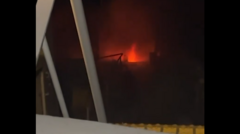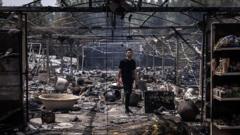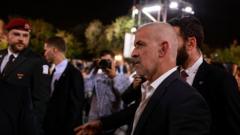In a show of force, Israel has carried out airstrikes near the presidential palace in Damascus as tensions rise between pro-government forces and the Druse minority. The Israeli government has warned against threats to the Druse community, emphasizing a potential regional stability concern.
Israel Conducts Airstrikes in Damascus Amid Rising Sectarian Violence

Israel Conducts Airstrikes in Damascus Amid Rising Sectarian Violence
Israeli fighter jets target Damascus in response to escalating clashes involving Syria's Druse minority, marking a significant military intervention.
Despite the rising death toll from recent clashes, the Syrian government remained silent following the strikes, exacerbating an already volatile situation.
In the early hours of Friday, Israeli fighter jets launched an attack near the presidential palace in Damascus, signaling a firm stance against the ongoing sectarian violence impacting the Druse minority in Syria. This military intervention comes as tensions have surged, with over 100 lives lost in recent confrontations between Syrian pro-government troops and Druse militants. The Druse group, which adheres to a unique religious doctrine rooted in Islam, has established cross-border ties with the Druse community in nearby Israel.
Israeli Prime Minister Benjamin Netanyahu and Defense Minister Israel Katz issued a joint statement following the airstrikes, asserting that these actions were intended as a stern warning to the Syrian government amidst the escalating violence. "This is a clear message to the Syrian regime," they relayed, indicating that Israel would not tolerate any potential threats to the Druse community, who are perceived as allies.
The Israeli military confirmed that its planes targeted the area around the palace of Ahmed Hussein al-Shara, Syria's president and a controversial figure with ties to both Al-Qaeda affiliations and the Assad regime. The airstrikes were said to be a defensive measure, responding to a situation that Israel has described as increasingly precarious.
Social media surfaced images of smoke rising over Damascus following the attacks, although details regarding the extent of the damage and specific targets remain unclear. In the aftermath, the Syrian government has not issued a statement, leaving both national and international observers eager to see how this escalation will unfold.
The incident underscores the fragile stability within the region, highlighting the complex interplay between local sectarian dynamics and broader geopolitical factors, as Israel continues to monitor threats emanating from its northern neighbor.
In the early hours of Friday, Israeli fighter jets launched an attack near the presidential palace in Damascus, signaling a firm stance against the ongoing sectarian violence impacting the Druse minority in Syria. This military intervention comes as tensions have surged, with over 100 lives lost in recent confrontations between Syrian pro-government troops and Druse militants. The Druse group, which adheres to a unique religious doctrine rooted in Islam, has established cross-border ties with the Druse community in nearby Israel.
Israeli Prime Minister Benjamin Netanyahu and Defense Minister Israel Katz issued a joint statement following the airstrikes, asserting that these actions were intended as a stern warning to the Syrian government amidst the escalating violence. "This is a clear message to the Syrian regime," they relayed, indicating that Israel would not tolerate any potential threats to the Druse community, who are perceived as allies.
The Israeli military confirmed that its planes targeted the area around the palace of Ahmed Hussein al-Shara, Syria's president and a controversial figure with ties to both Al-Qaeda affiliations and the Assad regime. The airstrikes were said to be a defensive measure, responding to a situation that Israel has described as increasingly precarious.
Social media surfaced images of smoke rising over Damascus following the attacks, although details regarding the extent of the damage and specific targets remain unclear. In the aftermath, the Syrian government has not issued a statement, leaving both national and international observers eager to see how this escalation will unfold.
The incident underscores the fragile stability within the region, highlighting the complex interplay between local sectarian dynamics and broader geopolitical factors, as Israel continues to monitor threats emanating from its northern neighbor.




















